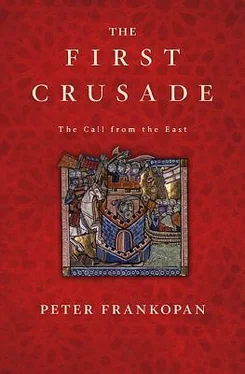Alexios’ priority was to get knights to cross the Bosphorus to Kibotos, where arrangements had been put in place to receive and supply large numbers of men. This was a matter of urgency, as the emperor’s efforts against Godfrey of Bouillon showed. As we have seen, when the Crusaders approached Constantinople, a sense of foreboding had spread through the city. Some speculated that the expedition’s real target was not Jerusalem but the Byzantine capital itself. The Crusaders, wrote Anna Komnene, were ‘of one mind and in order to fulfil their dream of taking Constantinople, they adopted a common policy, which I have often referred to before: to all appearances they were on pilgrimage to Jerusalem; in reality, they planned to dethrone the emperor and seize the capital’. 75This view was not just confined to Byzantines, who tended to be suspicious of the hidden agendas of foreigners. Other observers, like Michael the Syrian, writing on the periphery of the empire, also believed that the Crusaders had not only skirmished with the Byzantines but had launched an outright assault on Constantinople. 76
The fears of the capital’s inhabitants were heightened by the attacks of Godfrey of Bouillon. Anxiety was greatest among those closest to the emperor. Alexios’ few remaining allies in Constantinople believed that hostile factions within the city would take advantage of the arrival of the Crusaders to rise up against the emperor. Some wanted to settle scores going back to seizure of power by the Komnenoi, and there were also more recent grievances in the wake of the Diogenes conspiracy. According to the Alexiad , at one point the emperor’s followers rushed to the palace to mount a desperate last stand against the disaffected inhabitants of the city, whom they expected to rise at any moment. The emperor was urged to put on his armour and prepare for a fight to the death, but Alexios remained impassively on his throne in an admirable display of theatrical sangfroid. 77
Rumours of plots to overthrow Alexios continued to circulate both inside Constantinople and beyond its walls. Mysterious strangers approached at least one of the western leaders when he reached the capital, warning that the emperor was devious and wily, and urging him not to trust Alexios’ promises and flattery. 78Add to this suspicions about the Crusaders and their intentions, and moving the Crusaders on to Kibotos was essential for the security of Alexios’ regime. 79The presence of large numbers of armed men so close to Constantinople was dangerous in itself; but there was the additional concern that those in the city might look for help from the newly arrived cohorts, or simply take advantage of the edgy situation, to make a move against the emperor.
Alexios had considered this in advance. Although he had brought all the principal western leaders to Constantinople ahead of their men to entertain them and win their goodwill, he also sought to bind them to him formally. One way he did so was by adopting them as his sons. This was an old tradition whereby Byzantine emperors established a spiritual and paternal relationship with foreign magnates. The Crusaders did not seem to have thought this strange; it was the emperor’s custom to adopt high-ranking foreigners, wrote one chronicler, and the leaders were happy to acquiesce. 80Another simply noted without comment that Alexios adopted all the western leaders as his sons. 81But sensitive to the fact that adoption was a uniquely Byzantine custom, Alexios reinforced the bond with the main leaders in terms that they would certainly understand: Bohemond, Godfrey, Raymond of Toulouse, Hugh of Vermandois, Robert of Normandy, Robert of Flanders and Stephen of Blois were all asked to swear an oath of fealty to the emperor.
Fealty was a key element in the feudal structure and well established in western Europe by the time of the First Crusade. It created a relationship with specific legal implications between a vassal on the one hand, and a master on the other. 82Paying homage, the vassal committed to serve his lord and not harm him by swearing an oath over the Bible or another suitable religious object, such as a sacred relic, in front of a cleric. It was this loyalty that Alexios Komnenos sought to extract from the visiting Crusaders. As Anna Komnene later put it, the emperor was asking each leader to become his ‘ anthropos lizios ’ – his liegeman. 83
When this request was put to the more important aristocrats on the expedition, some objected strongly to any suggestion that they – leaders in their own lands – should pay obeisance to any man at all, let alone to Alexios, to whom they owed no obligation or duty. The objections were vociferous: ‘This our leaders flatly refused to do, and they said “Truly, this is unworthy of us, and it seems unjust that we should swear to him any oath at all.”’ 84Complaints were not unanimous, though: Hugh of Vermandois, Stephen of Blois and others were willing to swear loyalty to the emperor. This was perhaps because they had been so well looked after in Constantinople, but there would also have been an element of pragmatism, given that they needed the help and support of the emperor to make it to Jerusalem. As one eyewitness reported, ‘To these, then, the emperor himself offered as many coins and silken garments as he pleased; also some horses and some money, which they needed to complete such a great journey.’ 85This was acknowledged by the author of the Gesta Francorum who, consistently hostile to Alexios and Byzantium, struggled to understand why oaths were given by the expedition’s leaders. ‘Why did such brave and determined knights do a thing like this? It must have been because they were driven by desperate need.’ 86
Bohemond, meanwhile, had his eye on a bigger prize, suggesting to Alexios that he should be appointed to lead the imperial army in the east – a position that presumably still lay vacant following the disgrace of Adrian Komnenos, the military’s previous commander-inchief. 87With everything to gain from the expedition and little to lose, Bohemond from the outset sought to position himself as the emperor’s right-hand man; he was quick to see that there were serious opportunities if he played his hand well. 88
When agreement was finally reached with Godfrey of Bouillon after the fighting over the winter of 1096–7, part of the settlement was that the duke would take the oath to Alexios as others had already done. When he did so, ‘he received generous amounts of money, and he was invited to share Alexios’ hearth and table and was entertained at a magnificent banquet ... The emperor then gave orders that plentiful supplies should be made available for his men.’ 89
The oaths had two separate and distinct purposes for Alexios. The first was the long-term aim of ensuring that all future gains made by the western knights across Asia Minor would revert to him in due course. But there was a short-term goal too: to safeguard his own position in Constantinople as the Crusaders gathered in Byzantium. The latter lay behind the compromise reached with Raymond of Toulouse, who rebuffed Alexios’ demand for homage point-blank: ‘Raymond responded that he had not taken the Cross to pay allegiance to another lord, or to be in the service of any other than the One for whom he had abandoned his native land and his paternal goods.’ 90
For a time, the count’s refusal to take the pledge threatened to destabilise the expedition, both by delaying its progress and also because other leaders had already given commitments to the emperor. Robert of Flanders, Godfrey of Bouillon and Bohemond, all of whom had sworn the oath, urged Raymond to do the same, to little avail. Eventually, a compromise was reached: ‘At this juncture, following consultation with his men, the count swore that neither he nor those in his service would harm the emperor’s life or deprive him of his possessions.’ He continued to insist, however, that he would not pay homage ‘because of the peril to his rights’. 91The fact that Alexios was prepared to accept this compromise reveals his primary concern: with the Crusader camp outside the city walls, the emperor required re assurance that his life and position was not under threat.
Читать дальше











